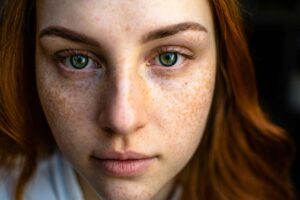What is called Real Beauty? There’s something I need to do before I start. You’ll see in a minute. I’m actually going to take my makeup off. This is me.
Facing the Reality: Do We Value Looks Over Substance?
As I stand here makeup-free, I have a few questions for you. Do you think I’m less professional because I’m makeup-free? Am I not as pretty? Or maybe you think I’m brave? Would you stand here without makeup? Do you leave the house without makeup? Do you go to the office, to dinner, to a date or a club makeup-free? This is something we need to think about.
My Early Years in the Modelling Industry
This is me from the age of 10 to 16. I was a model from a very young age. At ten, I wanted to be a princess, so modelling was fun, it was like playing dress-up. But at that age, I didn’t realize how damaging the industry could be until I got older.
Models are everywhere, and many people compare themselves to the images they see. When you think of the standard of beauty, what comes to mind? For most of us, especially in this generation, the media shows us a certain standard.
The Standard of Beauty: Unrealistic Expectations
What do we see as the standard of beauty in the media? Things like clear, flawless skin, being skinny yet curvy in all the right places, having big eyes, full lips, and long hair. These are the elements we’re told are beautiful. But the truth is, it’s almost impossible for one person to embody all of these qualities naturally unless, of course, they pay for it.
And I was part of the problem. As a model, I was supposed to represent this unrealistic standard. Even though I had clear skin, big eyes, and was tall and skinny, they still edited me. They airbrushed my skin, made me skinnier, changed many aspects of my appearance. It got to the point where my friends said, ‘That doesn’t look like you.’ And they were right.
The Turning Point: When Acne Entered My Life
Then things changed. This is me at 16, after overnight developing severe acne. I went from being a model with porcelain skin to having acne that I couldn’t control. All my modelling agencies told me to clear my skin and come back in a week. That was impossible.
I felt like it was my fault. Suddenly, I didn’t fit the standard of beauty anymore, and I was dropped from the career I had loved for six years. I was lost, alone, and uneducated about my skin.

Struggling to Find Help: Where Were the People with Acne?
At the time, social media wasn’t as prevalent as it is now, so I turned to the media for help. But I couldn’t find anyone with acne in magazines or on TV. Even in acne ads, the models had clear skin. I felt completely isolated.
Acne treatments didn’t work, and I resorted to trying everything under the sun—egg whites, papaya, turmeric (which turned my face yellow for two days). I was desperate.
The Loneliness of Acne
Acne is so common—80% of people experience it at some point in their lives, and many are adults. But where were the women like me? Why didn’t I see them in the media? Why did I feel so alone in this?
At my lowest point, around the age of 21, acne had consumed my life. I would skip social events, avoid friends, and even miss out on basic necessities like going to the store for food because I didn’t want anyone to see my skin.
The Shift: Starting the Conversation
Eventually, I reached my breaking point. One night, I took a photo of my skin and, despite crying after, I uploaded it to Instagram. Back then, I had about 10,000 followers from fashion-related posts, but the response was overwhelming. I woke up to hundreds of comments from people saying, ‘I have acne too,’ ‘I can relate,’ and ‘This is the first time I’ve seen someone with acne.’
This was a turning point for me. I realized I wasn’t alone, and I wanted to keep having these open discussions with others going through the same thing.
Building a Community of Support
As I continued talking about my acne, I built a community of people who supported me, and in turn, I supported them. This community helped me heal because, by talking about it, I started to accept it. I was no longer hiding behind makeup or ashamed of my skin. I embraced my acne as part of who I am, and that acceptance changed my life for the better.
By sharing my story, I hope to help others who feel alone in their journey with acne. It’s okay to not fit the ‘standard’ of beauty. Beauty comes in many forms, and the first step to feeling beautiful is accepting yourself as you are.